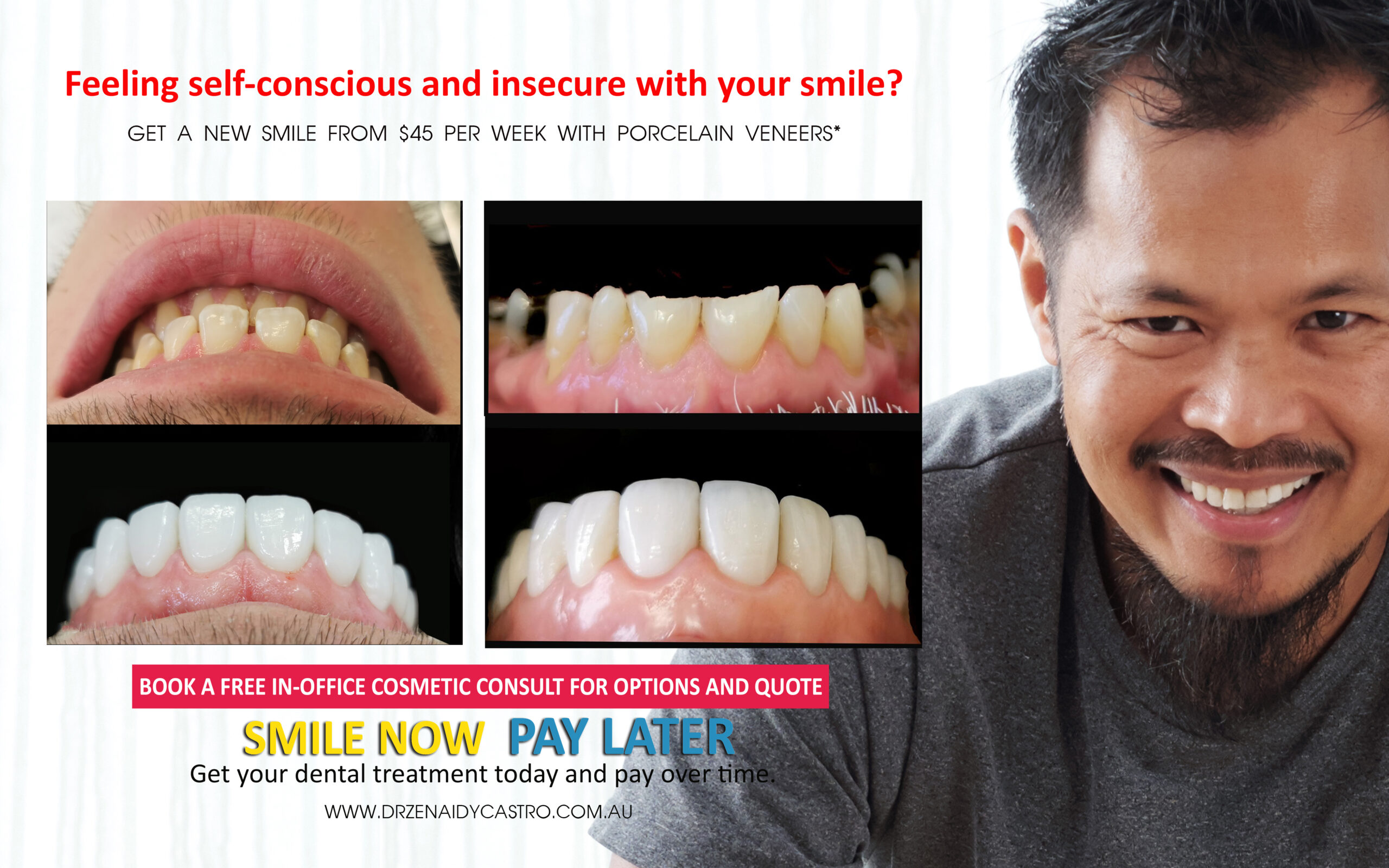

✨Your complete oral hygiene guide for maintaining healthy teeth and gums throughout your life
✨Evidence-based tips and techniques used by dental professionals in Melbourne CBD & Noble Park North
✨Simple daily routines that prevent costly dental problems and keep your smile bright
✨Learn how oral health directly impacts your overall wellbeing and general health
✨Professional insights on choosing the right products and techniques for your specific needs
✨Common mistakes people make and how to avoid them for better oral health outcomes
???? Call Vogue Smiles Melbourne and Noble Park today for a comprehensive general and smile makeover treatment — offering competitive pricing, bundled porcelain veneer specials, interest-free dental plans, and Superannuation access assistance.
REQUEST AN ONLINE PERSONALIZED QUOTE ➤
REQUEST FOR A FREE TELECONSULTATION ➤
Taking care of your teeth isn’t just about having a beautiful smile – it’s about protecting your overall health and wellbeing. Many people don’t realize that poor oral hygiene can lead to serious health complications, including heart disease, diabetes complications, and respiratory infections. This comprehensive oral hygiene guide will show you exactly how to maintain healthy teeth using proven techniques recommended by dental professionals.
Whether you’re dealing with sensitive teeth, gum problems, or simply want to prevent future dental issues, this guide covers everything you need to know. We’ll explore the connection between oral health and your general wellbeing, share practical tips you can implement today, and answer the most common questions patients ask at our Melbourne CBD & Noble Park North dental practices.
ORAL HEALTH AND GENERAL HEALTH: THE VITAL CONNECTION
Your mouth is the gateway to your body, and what happens inside affects your entire system. Research consistently shows that oral health problems don’t stay confined to your mouth – they can trigger or worsen conditions throughout your body. Understanding this connection is the first step in taking your oral hygiene guide seriously.
The Mouth-Body Connection Explained
When bacteria from gum disease enter your bloodstream, they can travel to other parts of your body. This process, called bacteremia, can cause inflammation in your arteries, potentially leading to heart disease. Studies show that people with severe gum disease have a 40% higher risk of developing cardiovascular problems.
The bacteria don’t stop there. They can also affect your respiratory system, especially if you have existing conditions like asthma or COPD. Patients with poor oral hygiene are more likely to develop pneumonia and other respiratory infections. This is why maintaining healthy teeth goes far beyond cosmetic concerns.
Diabetes and Oral Health: A Two-Way Street
If you have diabetes, your oral hygiene guide becomes even more critical. High blood sugar levels make it harder for your body to fight infections, including gum disease. At the same time, gum disease can make it more difficult to control your blood sugar levels, creating a dangerous cycle.
Many patients at our Melbourne CBD & Noble Park North clinics have found that improving their oral hygiene significantly helps with diabetes management. Regular dental cleanings and proper home care can reduce inflammation and help stabilize blood sugar levels.
ORAL HEALTH: A WINDOW TO YOUR OVERALL HEALTH
Your dentist can often detect signs of systemic diseases before other symptoms appear. During routine checkups, we look for indicators that might suggest underlying health conditions. This makes regular dental visits an important part of your overall healthcare routine, not just your oral hygiene guide.
Warning Signs Your Mouth Reveals
Your oral health can reveal important clues about your general wellbeing. Here are key indicators dental professionals watch for:
- Persistent bad breath: May indicate liver problems, kidney disease, or diabetes complications
- Bleeding gums: Could signal blood clotting disorders or vitamin deficiencies
- Dry mouth: Often linked to autoimmune conditions like Sjögren’s syndrome
- White patches: May be early signs of oral cancer or HIV-related conditions
- Loose teeth: Could indicate osteoporosis or other bone-related diseases
These symptoms don’t automatically mean you have a serious condition, but they’re important signals that shouldn’t be ignored. Regular dental checkups help catch these early warning signs before they become major health issues.
The Immune System Connection
Chronic oral infections force your immune system to work overtime. When your body is constantly fighting bacteria in your mouth, it has fewer resources to protect against other infections and diseases. This is why people with poor oral hygiene often get sick more frequently and recover more slowly.
Maintaining healthy teeth through proper oral hygiene helps preserve your immune system’s strength. This means you’ll be better equipped to fight off colds, flu, and other infections throughout the year.
BEST PRACTICES & INSTRUCTIONS TO MAINTAIN YOUR ORAL HEALTH
Now that you understand why oral health matters for your overall wellbeing, let’s dive into the practical steps of how to maintain healthy teeth. These evidence-based practices form the foundation of any effective oral hygiene guide.
The Foundation: Proper Brushing Technique
Most people think they know how to brush their teeth, but technique matters more than you might realize. Poor brushing can actually damage your teeth and gums while leaving harmful bacteria behind. Here’s the professional approach we recommend to patients in Melbourne CBD & Noble Park North:
- Choose the right toothbrush: Soft-bristled brushes are gentler on your enamel and gums
- Use fluoride toothpaste: Fluoride helps remineralize your teeth and prevent decay
- Brush for two full minutes: Set a timer or use an electric toothbrush with a built-in timer
- Use gentle, circular motions: Avoid aggressive scrubbing that can wear down enamel
- Don’t forget your tongue: Bacteria on your tongue contribute to bad breath and oral health problems
Replace your toothbrush every three months or after you’ve been sick. Worn bristles don’t clean effectively, and old toothbrushes can harbor bacteria that reinfect your mouth.
The Game-Changer: Flossing Daily
Flossing removes plaque and food particles from areas your toothbrush can’t reach. This step is crucial for how to maintain healthy teeth because most tooth decay and gum disease starts between teeth. Yet many people skip flossing or do it incorrectly.
Here’s the proper flossing technique that prevents damage while maximizing cleaning:
- Use about 18 inches of floss: Wind most around your middle fingers, leaving about 2 inches to work with
- Gently guide floss between teeth: Don’t snap it down onto your gums
- Curve the floss: Make a C-shape around each tooth and slide it under the gumline
- Use clean sections: Move to a fresh section of floss for each tooth
- Be gentle but thorough: You should feel slight resistance, but it shouldn’t be painful
If traditional floss is difficult for you, consider water flossers or floss picks. The important thing is that you clean between your teeth every day as part of your oral hygiene guide routine.
Mouthwash: The Finishing Touch
Mouthwash isn’t just for fresh breath – it’s an important part of maintaining healthy teeth. The right mouthwash can kill bacteria that brushing and flossing miss, reduce plaque buildup, and strengthen your tooth enamel.
Look for mouthwashes that contain fluoride and have the Australian Dental Association (ADA) seal of approval. If you have specific concerns like dry mouth or gum disease, ask your dentist to recommend a therapeutic mouthwash designed for your needs.
HEALTHY TEETH: ADVANCED TIPS FOR TOOTH HEALTH AND ORAL HYGIENE
Beyond the basics, there are additional strategies that can significantly improve your oral health outcomes. These advanced tips are based on the latest research and clinical experience from dental professionals.
Nutrition for Stronger Teeth
What you eat directly affects your oral health. Your teeth and gums need specific nutrients to stay strong and resist disease. Understanding the connection between nutrition and how to maintain healthy teeth can transform your oral health.
Foods that promote healthy teeth include:
- Calcium-rich foods: Dairy products, leafy greens, and almonds strengthen tooth enamel
- Vitamin D sources: Fatty fish, egg yolks, and fortified foods help your body absorb calcium
- Vitamin C foods: Citrus fruits, berries, and vegetables support healthy gums
- Crunchy fruits and vegetables: Apples, carrots, and celery naturally clean teeth
- Green tea: Contains antioxidants that fight bacteria and reduce inflammation
Limit sugary and acidic foods that feed harmful bacteria and weaken tooth enamel. When you do consume these items, rinse with water afterward and wait at least 30 minutes before brushing to avoid damaging softened enamel.
Timing Matters: When to Clean Your Teeth
The timing of your oral hygiene routine can impact its effectiveness. Many patients in Melbourne CBD & Noble Park North are surprised to learn that brushing immediately after eating can sometimes do more harm than good.
Here’s the optimal timing for your oral hygiene guide routine:
- Morning brushing: Brush before breakfast to remove overnight bacteria buildup
- After meals: Wait 30-60 minutes before brushing to let your saliva neutralize acids
- Evening routine: Brush and floss before bed to remove the day’s accumulation of plaque
- Snack strategy: Rinse with water after snacking to wash away food particles
If you can’t wait to brush after eating something particularly sugary or acidic, rinse with water first and use a soft-bristled toothbrush with minimal pressure.
Professional Care: Your Oral Health Team
Even the most diligent home care can’t replace professional dental cleanings and checkups. Regular visits to your dentist and dental hygienist are essential components of how to maintain healthy teeth throughout your life.
Professional dental care provides benefits you can’t achieve at home:
- Tartar removal: Only professional tools can remove hardened plaque (tartar)
- Early detection: Professionals can spot problems before they become painful or expensive
- Personalized advice: Your oral hygiene guide should be tailored to your specific needs and risk factors
- Preventive treatments: Fluoride treatments and sealants can prevent future problems
- Professional guidance: Learn proper techniques and get recommendations for products that work best for you
Most people should see their dentist every six months, but some individuals may need more frequent visits based on their oral health status and risk factors.
COMMON MISTAKES THAT SABOTAGE YOUR ORAL HEALTH
Even people who think they’re following a good oral hygiene guide often make mistakes that undermine their efforts. Avoiding these common pitfalls can dramatically improve your results and help you maintain healthy teeth more effectively.
Brushing Too Hard
Many people believe that brushing harder means cleaning better, but this approach can actually damage your teeth and gums. Aggressive brushing can wear away tooth enamel, cause gum recession, and create sensitivity problems that make eating and drinking uncomfortable.
Signs you might be brushing too hard include:
- Your toothbrush bristles fray quickly (within a month)
- Your gums bleed regularly during brushing
- You experience tooth sensitivity to hot or cold
- Your gums appear to be receding from your teeth
Switch to a soft-bristled toothbrush and focus on technique rather than pressure. Let the bristles do the work – gentle, consistent motion is much more effective than aggressive scrubbing.
Neglecting Your Tongue
Your tongue harbors millions of bacteria that can cause bad breath and contribute to oral health problems. Many people focus entirely on their teeth and forget about tongue cleaning, which is a crucial part of any complete oral hygiene guide.
Use your toothbrush or a specialized tongue scraper to gently clean your tongue from back to front. This simple addition to your routine can significantly improve your breath and overall oral health.
Using Your Teeth as Tools
Your teeth are designed for chewing food, not opening packages, cracking nuts, or holding objects. Using your teeth as tools can cause chips, cracks, or complete breaks that require expensive dental work to repair.
Common habits that damage teeth include:
- Opening packages with your teeth
- Biting fingernails or pen caps
- Chewing on ice cubes
- Using teeth to straighten bent objects
- Holding pins or nails while working
Keep proper tools handy so you’re not tempted to use your teeth inappropriately. If you catch yourself using your teeth as tools, make a conscious effort to stop and find the right implement for the job.
SPECIAL CONSIDERATIONS FOR DIFFERENT LIFE STAGES
Your oral hygiene guide should evolve as you age and experience different life circumstances. What works for a teenager might not be optimal for a pregnant woman or someone in their golden years. Understanding these differences helps you maintain healthy teeth throughout your entire life.
Pregnancy and Oral Health
Pregnancy hormones can make your gums more sensitive and prone to inflammation. Many expectant mothers at our Melbourne CBD & Noble Park North practices experience “pregnancy gingivitis” – swollen, bleeding gums that can be uncomfortable and concerning.
Special considerations for pregnant women include:
- More frequent dental cleanings: May be needed to control gum inflammation
- Gentle oral hygiene: Use extra-soft toothbrushes and be patient with sensitive gums
- Morning sickness management: Rinse with water after vomiting, wait before brushing
- Increased calcium needs: Support both your health and your baby’s developing teeth
Don’t skip dental care during pregnancy – it’s safe and important for both you and your baby’s health. Untreated oral infections can potentially lead to pregnancy complications.
Oral Health for Seniors
As we age, our oral health needs change. Medications can cause dry mouth, making it harder to fight bacteria. Arthritis might make brushing and flossing more difficult. Understanding how to maintain healthy teeth as a senior requires adapting your approach.
Senior-specific strategies include:
- Electric toothbrushes: Easier to use for people with limited mobility
- Dry mouth management: Stay hydrated and consider saliva substitutes
- Denture care: If you wear dentures, clean them daily and maintain regular dental visits
- Medication review: Discuss oral health side effects with your doctor and dentist
Many seniors assume tooth loss is inevitable, but with proper care, you can keep your natural teeth for life. The key is staying proactive about your oral hygiene guide and addressing problems early.
FREQUENTLY ASKED QUESTIONS ABOUT ORAL HYGIENE
How often should I replace my toothbrush for optimal oral hygiene?
Replace your toothbrush every 3-4 months or immediately after being sick. Worn bristles don’t clean effectively, and bacteria can accumulate on old toothbrushes. Electric toothbrush heads should also be replaced every 3 months for best results in your oral hygiene routine.
Is it better to brush before or after breakfast to maintain healthy teeth?
Brush before breakfast to remove overnight bacteria buildup and protect your teeth from acid attacks during eating. If you prefer brushing after meals, wait at least 30 minutes to avoid damaging enamel that’s been temporarily softened by food acids.
Can poor oral hygiene really affect my overall health and wellbeing?
Yes, poor oral hygiene is linked to serious health conditions including heart disease, diabetes complications, respiratory infections, and stroke. Bacteria from gum disease can enter your bloodstream and cause inflammation throughout your body, making your oral hygiene guide crucial for total health.
What’s the best way to floss if I have tight spaces between my teeth?
Try waxed dental floss or floss picks for tight spaces. Water flossers are also excellent alternatives that can reach between tight teeth. The key is using gentle pressure and a rocking motion rather than forcing floss down aggressively between teeth.
How do I know if I’m brushing my teeth correctly for optimal oral health?
Brush for two minutes using gentle circular motions, not aggressive scrubbing. Your toothbrush bristles shouldn’t fray within a month, and your gums shouldn’t bleed regularly. If you experience sensitivity or gum recession, you may be brushing too hard and should switch to a softer technique.
Should I use mouthwash as part of my daily oral hygiene guide?
Mouthwash can be a valuable addition to brushing and flossing, especially therapeutic mouthwashes with fluoride. However, it shouldn’t replace proper brushing and flossing. Choose mouthwashes with the ADA seal of approval and avoid alcohol-based products if you have dry mouth.
What foods should I avoid to maintain healthy teeth?
Limit sugary and acidic foods like sodas, candy, citrus fruits, and sports drinks that feed harmful bacteria and weaken enamel. When you do consume these items, rinse with water afterward and wait 30 minutes before brushing to protect your teeth.
How often should I visit the dentist for professional oral health care?
Most people should visit their dentist every six months for cleanings and checkups. However, if you have gum disease, diabetes, or other risk factors, your dentist may recommend more frequent visits every 3-4 months for optimal oral health maintenance.
Can I maintain healthy teeth without fluoride toothpaste?
Fluoride toothpaste is highly recommended because fluoride helps remineralize teeth and prevent decay. While some people prefer fluoride-free options, they may have higher risk of cavities. Discuss alternatives with your dentist if you’re concerned about fluoride use in your oral hygiene routine.
What’s the connection between gum disease and diabetes?
Gum disease and diabetes have a two-way relationship. High blood sugar makes it harder to fight gum infections, while gum disease can make blood sugar harder to control. People with diabetes need extra vigilant oral hygiene to prevent complications affecting both conditions.
Is it normal for my gums to bleed during brushing and flossing?
Occasional light bleeding when starting a new flossing routine is normal, but regular bleeding indicates gum inflammation or gingivitis. Consistent bleeding during your oral hygiene routine should be evaluated by a dentist, as it may signal the need for professional treatment.
What should I do if I have persistent bad breath despite good oral hygiene?
Persistent bad breath despite proper oral hygiene may indicate underlying dental problems, dry mouth, or systemic health issues. Visit your dentist to rule out oral causes, and consider discussing with your doctor if dental examination doesn’t reveal the source of the problem.
YOUR PATH TO LIFELONG ORAL HEALTH
Maintaining healthy teeth isn’t complicated, but it does require consistency and the right approach. This comprehensive oral hygiene guide provides you with evidence-based strategies that dental professionals use and recommend to their patients in Melbourne CBD & Noble Park North.
Remember that your oral health is an investment in your overall wellbeing. The time and effort you put into your daily oral hygiene routine will pay dividends in terms of better health, confidence, and quality of life. Small changes in your routine can lead to significant improvements in your oral health outcomes.
Start implementing these strategies today, and don’t hesitate to reach out to dental professionals when you need guidance or support. Your teeth are meant to last a lifetime, and with proper care, they can serve you well for many years to come. Make your oral hygiene guide a priority, and enjoy the benefits of a healthy, confident smile.
Take action now – your future self will thank you for the investment you make in your oral health today. Whether you’re just starting to take oral hygiene seriously or looking to improve your existing routine, these proven strategies will help you achieve and maintain the healthy teeth you deserve.
Book online anytime:
Request a free teleconsult:

Protect Your Smile with Smarter Oral Hygiene
A healthy smile starts with strong daily habits. At Vogue Smiles Melbourne and Noble Park, we empower you with expert advice, personalised care, and proven techniques to maintain excellent oral hygiene for life. Don’t wait for dental issues to appear—book your check-up today and take control of your oral health with confidence!
Book Your Teeth Whitening Consultation
???? Call (03) 9629 7664 | 0413 014 122
REQUEST AN ONLINE PERSONALIZED QUOTE ➤
REQUEST FOR A FREE TELECONSULTATION ➤


Disclaimer:
The information on this website is for information purposes only. Is not a substitute for a proper professional care and advice. Each patient’s outcomes, risks, potential complications, and recovery differ. Any dental procedure, minor or major, carries risks, some minor and some serious. Before and after images seen on our Social Media and website pages are our actual patient and have been published/posted with our patients’ permission. All of our patients photos are subject to Copyrights protection. We are strong believers in responsible aesthetics. Every cosmetic, medical, or dental procedure comes with its own set of risks and benefits. Cosmetic Dentistry results will vary from patient to patient. Call our office and book for an actual in-office consultation for us to assess if you are a good candidate for a particular treatment. All of our Specials and packages posted on this site are subject to terms, conditions and availability. The exact fee for a particular cosmetic procedure will be determined after a preliminary assessment distinguishing your unique personal needs and the type of work needed. The prices mentioned on any of our website as well as any mentioned payment plan by a third party source, are just a guide and is subject to change. Call the third party financing providers or visit their website for more info. Please call the office on 9629-7664 for further queries or clarification.




